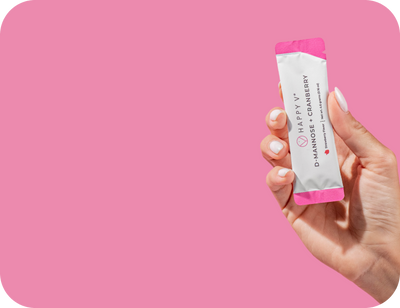- Fact Checked
- June 12, 2025
- 9 min read
How to Know If Your Probiotics Are Working (or Aren’t)
Table of Contents
Table of Contents
Probiotics are everywhere—on shelves, in smoothies, even in skincare. But how do you know if they’re actually doing anything?
Whether you're taking probiotic products for gut health, vaginal balance, immunity, or mood, this guide explains how probiotics work, what results to look for, and how to know whether your supplement is worth it.
If you’re dealing with digestive issues, skin flare-ups, weakened immunity, or frequent infections, your body might signal that your gut needs help.
Even if you're symptom-free, daily probiotic use can support prevention and long-term wellness goals and promote a balanced gut.
This post is for informational purposes only and does not constitute medical advice. See full disclaimer below.
What Are Probiotics and Why Do They Matter?

Probiotics are live microorganisms—mostly beneficial bacteria like Lactobacillus, Bifidobacterium, and yeast strains like Saccharomyces boulardii—these bacteria offer health benefits in a wide variety of ways, like maintaining your vaignal pH, improving gut health, and strengthening your immunity.
You can naturally find them in dairy-based products like kefir and yogurt, fermented foods (like kimchi, sauerkraut, kefir, kombucha, and miso), and high-quality dietary supplements.
9 Signs You Might Need Probiotics

Daily probiotic supplements can be a smart addition to the daily routine of anyone looking to improve their overall wellness, but given how they actually function within the body, they can be especially good if you're someone who:
-
Has ongoing digestive issues
If you're struggling with bloating, constipation, gas, and general discomfort after eating, this can point to an imbalanced gut microbiome that is affecting digestive function. Probiotics can help with that. -
Has recently taken antibiotics or had food poisoning
Both of these can totally deplete the levels of good bacteria in your body, which can lead to lingering digestive issues or secondary infections. Probiotics can boost these levels and rebalance your flora.
-
Gets sick frequently
70% of your immune system resides in your GI tract. If you're getting sick frequently - even with non-GI-related illnesses - improving your gut health with probiotics can increase your overall immunity.
-
Experiences acne, eczema, or skin irritation
Along with immunity, gut health also affects skin health. Imbalances in your gut microbiome can present as inflammation, breakouts, or chronic skin conditions.
-
Feels foggy, anxious, or struggles with sleep
Think the gut can't possibly affect anything else? Think again. It plays a huge role in regulating mood, cognition, and sleep cycles.
-
Has had unexplained weight changes
If you've gained or lost weight without a clear dietary or lifestyle cause, gut issues and inflammation could be to blame, both of which can improve with targeted probiotics.
-
Gets frequent UTIs or yeast infections
Probiotics don't just benefit the gut, but the vaginal microbiome as well, protecting against infections. If you can't kick your UTIs or yeast infection, low probiotic levels may be to blame.
-
Doesn't eat many fermented or fiber-rich foods
Probiotics and prebiotics are naturally occurring in fermented and fiber-rich food. If your diet is low in these things, you may want to consider supplementing.
-
Feels run-down or low on energy
If you continue to feel tired and sluggish even after a night of rest, it could be because poor nutrient absorption in the gut. Quality probiotics can improve absorption, and your energy levels along with them.
What About Prebiotics & Synbiotics?
We've covered what probiotics are and how they can help. Now let's talk about two other words you hear a lot in this space: prebiotics and synbiotics.
Prebiotics are essentially the food that probiotics eat that ultimately help them produce infection-fighting lactic acid, hydrogen peroxide, and bacteriocins. Prebiotics occur naturally in fiber-based foods like bananas, oats, and vegetables.
When prebiotics are combined with probiotics, the result is a synbiotic. At Happy V, we use a bacteriophagic prebiotic that helps clear harmful bacteria while making space for good bacteria to thrive—without retaining water that can degrade probiotic viability.
How Probiotics Work

Probiotics work in a few different ways. First, just by existing in your gut or vagina, they are competing for space and resources with infection-causing bacteria. They are literally crowding the bad guys out.
They also:
- Produce lactic acid and hydrogen peroxide, which keep a slightly acidic pH that kills bad bacteria
- Promote butyrate production in the gut, which reinforces the intestinal lining
- Stimulate the immune response
- Support serotonin production, which helps with mood balance and clarity
It's important to know, though, that not all probiotics have these effects. Only certain strains do, so it's important to make sure your probiotic only uses strains that have been clinically studied. Also make sure that your probiotic supplement uses acid-resistant capsules or delayed-release technology. This helps probiotics survive long enough to actually populate in your body, and not just get killed in your stomach.
When Will You Start Seeing Results?

The answer to this depends on your health history, your current symptoms, and how consistently you take your probiotics. While some changes happen within weeks, others take more time. Most people starting probiotics find it helpful to keep a journal to track their daily symptoms, so they can notice changes.
Though every body is different, here is what most people report when it comes to their results timeline:
| Health Area | Expected Changes | Timeline |
|
Digestive issues (IBS, bloating, constipation) |
Improved motility, less discomfort |
2–4 weeks |
|
Immune system |
Fewer colds, quicker recovery |
4–8 weeks |
|
Skin health |
Fewer flare-ups, reduced inflammation |
6–12 weeks |
|
Vaginal health |
Improved discharge, reduced infections |
4–8 weeks |
|
Weight/metabolism |
Waistline improvement, energy balance |
8–12 weeks |
|
Mental health & sleep |
Better sleep, mood, and clarity |
8–12 weeks |
Are There Side Effects of Taking Probiotics?
Most people tolerate probiotics well, but as your gut flora adjusts, temporary side effects can occur, especially in the first week or two. These are generally mild and temporary. That said, understanding what to expect helps you know when to adjust or speak with a healthcare provider.
However, temporary side effects may include mild bloating or gas. These tend to only last for a few weeks. If you are experiencing more prolonged or severe symptoms than this, stop taking your probiotics and call your doctor.
If you have a chronic condition or a weakened immune system, consult a healthcare provider first.

Signs Your Probiotic Is Working
The signs your probiotic is working depend on what symptoms caused you to start taking them in the first place. For many people, though, the first signs of improvement include:
- Less odor, discharge, or UTI symptoms (for vaginal infections)
- Less gas, bloating, and more regularity (for digestive issues)
- Fewer breakouts or reduced eczema (for skin issues)
- Better sleep and mood (for generall wellness)
Remember, these changes don't happen overnight, and consistency is key. Most people notice these changes within 4-8 weeks of daily use. If it's been 12 weeks or longer and you haven't noticed any improvements, you may not be using the right probiotic for you.
Why a Probiotic Might Not Be Working
If you are struggling to see results with your probiotic, even after consistent use, there could be a few factors at play, like:
- Strain mismatch. General probiotics may not include the targeted strains you need to clear up certain issues.
- Improper dosage. Even if your probiotic offers the right strains, they may not be dosed at effective levels, which means you don't see the benefits.
- Poor diet. Probiotics can't compete with a diet high in processed foods and low in fiber. In fact, that will sabotage your progress.
- Storage issues. Exposure to heat and moisture can render probiotics ineffective, even if they are within their expiration dates.
- Medication conflicts. Certain medications, like antibiotics or PPIs, can reduce probiotic efficacy and delay progress.
How to Choose the Right Probiotic

With so many probiotics lining the shelves, it’s easy to feel overwhelmed. And you do have to be smart about what you buy because not all probiotics are created equal.
Luckily, choosing a quality probiotic comes down to just a few key things:
- Clinically Relevant Dosage: The strains should be dosed at levels proven effective in actual clinical studies, not just whatever they felt like putting in.
- Transparent CFU Counts: When checking dosages, make sure they are listed in CFUs. "Proprietary blends" or "mg" are a red flag.
- Strain-Specific Labeling: A high-quality probiotic will list the genus, species, and strain on the label (think: L. rhamnosus HN001™, not just a vague “Lactobacillus.”)
- Guaranteed Expiration Date: Make sure the product guarantees viability up to its expiration date, assuming you store it as directed.
- Clear Storage Instructions: Because probiotics are actually alive, they typically come with storage instructions that help keep them that way. Look to see whether your supplement should be kept in the fridge or is shelf-stable.
Match Strains to Goals
Make sure always to read the label to choose the right probiotic for the right reason. Below is a cheat sheet so you can choose the right probiotic supplement.
| Health Issue | Proven Strains |
| BS (1)/ constipation | B. subtilis DE111®,B. lactis HN019™,PreforPro® (Bacteriophage blend) |
| Vaginal health | L. acidophilus LA-14®,L. rhamnosus HN001™,L. crispatus CCFM1110™,L. gasseri HLG13™,L. reuteri HR7™,PreforPro® |
| Immunity | B. lactis HN019™,L. acidophilus LA-14®, PreforPro® |
| Skin health | B. bifidum,B. lactis,L. acidophilus |
| Weight/metabolism | L. acidophilus LA-14®,B. lactis HN019™ |
Tracking Progress
Keeping track of how your body responds to probiotics is one of the best ways to evaluate effectiveness. A simple journal or notes app can help you spot improvements or plateaus in your digestive issues, skin health, immunity, and overall wellness. Use the table below to track changes and reassess after 6–8 weeks:
| Metric | What to Track | Frequency |
| Digestive issues | Bloating, stool form, cramping | Weekly |
| Immune system | Cold frequency, duration | Monthly |
| Mental health | Mood (1–10), clarity | Weekly |
| Sleep quality | Time to sleep, nighttime waking | Daily |
| Weight/metabolism | Waist circumference, cravings | Weekly |
| Skin health | Eczema, acne, dryness | Weekly |
| Vaginal health | Discharge, odor, recurrence | Monthly |
Final Thoughts
Probiotic supplements offer benefits beyond digestion. If you’re noticing recurring issues or just want to feel better day-to-day, your gut might be the place to start.
Choosing a high-quality probiotic with proven strains—backed by randomized controlled trials or systematic review—can support better gut health, immune resilience, mental clarity, cognitive function, and even skin.
For a trusted, clinically formulated product, try Happy V’s Prebiotic + Probiotic. It’s designed to support your vaginal, digestive, and immune systems—without the guesswork.
Your gut talks. Probiotics help you listen.








